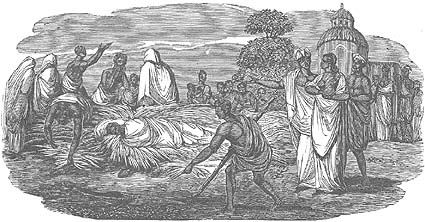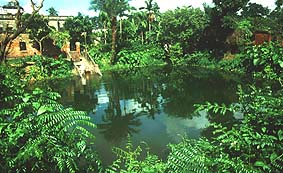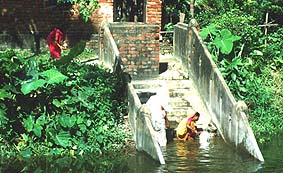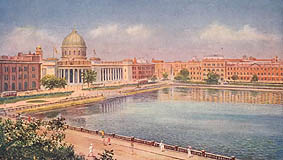

Nabobs - a name given to English East India Company employees who prospered in India and flaunted their newly acquired wealth back in England.
Nawab - a Muslim ruler in the Moghul empire, usually either a provincial governor, or a prince.
Oriya - the language of Orissa, closely akin to Bengali.
Paita - the sacred thread worn by the three higher castes - the priests, the warriors and the merchants.
Palanquin - a covered or enclosed litter, usually for one person, carried on curved bamboo poles on the shoulders of four or six bearers.
Pan - a slightly intoxicating mixture of areca nuts, lime, and spices, wrapped in a betel leaf and chewed to aid digestion. The residue forms a red liquid in the mouth and is spat out.
Panchway - a vessel suitable for navigating Bengal's shallow waterways, with a low roofed shelter for protection from the sun and rain, but no seats.
Parganas, 24 - nine hundred square miles of land, south of Calcutta, annexed by Robert Clive after the Battle of Plassey in 1757. It was to provide Clive with an income of £30,000 a year till the day he died. (11)
Particular - relating to Baptists. The doctrine that salvation is offered only to particular individuals, the elect, and not to the race. (12) In 1633 the Particular Baptists were founded. They were a group whose Calvinistic doctrine taught that atonement is particular or individual. Immersion was not yet insisted upon in these churches, but in 1644 seven Particular Baptist churches issued a confession of faith requiring that form of baptism, and Baptist was thenceforth the name given to those who practiced it.
In other denominations (such as the Methodists) the concept of the predestination of the elect were called Calvinists.
Peepul - one of the sacred trees of India, with a long pointed leaf.
Peon - a messenger.
Phaeton - a light, four-wheeled carriage containing one or two seats and drawn by a pair of horses.
Pice - a coin; a quarter of an Anna.
Pinnace - the same as a budgeree (see above).
Puja - Hindu ceremonial worship, ranging from simple private daily prayers, to elaborate temple rites and festivals, conducted by one or more priests, with its rituals varying widely depending on the occasion.
Pundit - a Brahmin scholar or religious teacher.
Punkah - a fan suspended from the ceiling, made either from a large palm frond, or of cloth held in a large rectangular frame, powered by a servant using a cord and pulley system.
Punkah-wallah - a servant who operated the punkah.
Pushtu, Pashtu, Pushtoo, Pashto, Pakhtu, Pakhto - the language of the Afghans.
Radha - a consort of Krishna.
'Ramayana' - one of India's two great religious epics.
Residency - the compound where the Resident and his staff lived and worked.
Resident - a British official attached to the court of an Indian ruler in a supposedly advisory, but often a dominating, capacity.
Rupee - a coin or note, made up of sixteen annas; the basic monetary unit of India. In Ward's day a rupee was worth approximately 2 shillings and 10 pence.
Ryot - a peasant.
Sadhu - a Hindu holy man, ascetic and mendicant. Possibly, under a tree, in a dirty sheet, with mud smeared on his arms and the white mark of Vishnu painted on his forehead, leaning on his quarter staff with his begging bowl in one hand, always in the same spot whenever you pass. (13)
Sahib - a title of respect equivalent to "sir"; a form of respectful address for a European, or an Indian man of rank in colonial India.
Sanskrit - the ancient, classical Indian language of India in which most of the texts of Hinduism were written, and from which most of the spoken languages of northern India are derived.
Sari - an outer garment worn by a woman consisting of a single length of cotton or silk, 5 to 7 yards long, most often with one end wrapped around the waist to form a skirt, the other draped over the shoulder, or head.
Sepoy - a Hindu or Muslim soldier armed and trained in the European manner by British officers, and serving, under British command, in native battalions in the army of the East India Company
Shastras - sacred Hindu books that regulate religious, social and professional behaviour and activities.
Shiva - the Destroyer; one of the divine triumvirate of Hindu mythology. The others being Brahma the Creator and Vishnu the Preserver.
Soodra - under the Hindu caste system, the fourth and lowest recognized varna, the servant and labouring class that served the three upper classes.
Subahdar major - the senior Indian officer in a native regiment of the British service.
Subaltern - a British officer equivalent to a lieutenant.

'Burning of Widows', an illustration from an American edition of 'A view of the History, Literature and Religion of the Hindoos', by William Ward, Hartford, 1824. Courtesy Derby Local Studies Library. Suttee - the Hindu practice of burning widows alive on their husband's funeral pyre.
'When the husband is directed by the physician to be carried to the river side, there being no hopes of his recovery, the wife declares her resolution to be burnt with him. In this case, she is treated with great respect by her neighbours, who bring her delicate food, &c. and when the husband is dead, she again declares her resolution to be burnt with his body. Having broken a small branch from the mango tree, she takes it with her, and proceeds to the body, where she sits down. The barber then paints her feet red; after which she bathes, and puts on new clothes. During these preparations, the drum beats a sound, by which it is known, that a widow is about to be burnt with the corpse of her husband. On hearing this all the village assembles. The son, or if there be no son, a relation, or the head man of the village, provides the articles necessary for the ceremony.
A hole is first dug in the ground, round which stakes are driven into the earth, and thick green stakes laid across to form a kind of bed; and upon these are laid, in abundance, dry faggots, hemp, clarified butter, pitch etc. The officiating brahmin now causes the widow to repeat the formulas, in which she prays, that "as long as fourteen Indrus reign, or as many years as there are hairs on her head, she may abide in heaven with her husband; that the heavenly dancers during this time may wait on her and her husband, and that by this act of merit all the ancestors of her father, mother, and husband, may ascend heaven." She now presents her ornaments to her friends, ties some red cotton on both wrists, puts two new combs in her hair, paints her forehead, and takes into the end of the cloth that she wears some parched rice and kourees.
While this is going forward, the dead body is anointed with clarified butter and bathed, prayers are repeated over it, and it is dressed in new clothes. The son next takes a handful of boiled rice, prepared for the purpose, and, repeating an incantation, offers it in the name of the deceased father. Ropes and another piece of cloth are spread upon the wood, and the dead body is laid upon the pile. The widow then walks around the pile seven times, strewing parched rice and kourees as she goes, which some of the spectators endeavour to catch, under the idea they will cure diseases.
The widow now ascends the fatal pile, or rather throws herself down upon it by the side of the dead body. A few female ornaments having been laid over her; the ropes are drawn over the bodies which are tied together, and faggots placed upon them. The son, then, averting his head, puts fire to the face of his father, and at the same moment several persons light the pile at different sides, when women, relations, &c. set up a cry: more faggots are now thrown upon the pile with haste, and two bamboo levers are brought over the whole, to hold down the bodies and the pile. Several persons are employed in holding down these levers, and others in throwing water upon them, that they may not be scorched. While the fire is burning, more clarified butter, pitch, and faggots, are thrown into it, till the bodies are consumed. It may take about two hours before the whole is burnt, but I conceive the woman must be dead in a few minutes after the fire has been kindled.' (14)
For more details and examples see the Digital Library Page.


A tank near Shibpur. Tank - a rectangular body of water used for bathing and washing.
Telegu - one of the Dravidian family of languages, spoken in south-eastern and central India.

A turn of the 20th century postcard of Dalhousie Square showing the Victorian General Post Office on the left, and the rebuilt Writer's Building on the right. The original Writer's Building housed Fort William College where Carey worked on his translations. The tank (or lake) is the site of the old Fort William.(15) To see the original Writer's Building click on the link. Tank Square, also known as Loll Diggy or Dalhousie Square - the heart of Calcutta. Government House is to the south, the Writer's building, which also housed Fort William College, filled the north side. The body of water at the centre, called the Tank, is the site of the original Fort William. After the destruction of Calcutta by Siraj-ud-Daula, and its recapture by the British, the old fort was raised, and the present fort built further south. The tank was the main source of water for the residents of Calcutta. It would be crowded all day with servants filling skin bags with 8 gallons of water at a time for their masters.(16)
Thug, Thugee - a highway robber who ritually murdered by strangulation, committed by members of a religious sect in honour of the goddess Kali. They knotted a silver coin consecrated to Kali in one corner of a handkerchief, to give them a better grip. (17)
Untouchables - under the Hindu caste system those who fall outside the system. They perform tasks deemed too polluting for those within the system and their lives are bounded by numerous restrictions to prevent them polluting caste members.
Upanishads - Hindu religious and philosophical texts.
Urdu -Hindustani: a form of it with many Persian and Arabic words, the official literary language of Pakistan.
Vaishya - under the Hindu caste system, the third of the four varnas, considered to be commoners and consisting of farmers, merchants, and some artisans.
Varna - any of the the four classes, or castes, into which society is divided under the Hindu caste system; specifically: Brahmin, kshatriya, vaishya and soodra. A fifth group, the untouchables, are so low socially that they fall outside the caste system.
Veda - any one of, or all of, four ancient holy books of the Hindus.
Vedanta - a system of Hindu philosophy based on the Vedas.
Vedist - one learned in the Vedas.
Viceroy - the term for the most senior figure in the Indian administration (formerly known as the Governor-General) when the British Government took over from the East India Company as the ruling power in India.
Vishnu - the Preserver; one of the divine triumvirate of Hindu mythology. The others being Shiva the Destroyer and Brahma the Creator.
White Town - the segregated area of Calcutta where the British and other Europeans lived.
Writers - Company servants. On the outward voyage they were required to salute the captain of the Indiaman on his quarterdeck whenever they saw him during the voyage. They appeared at meals to a roll of drums and they had to have their cabin lights out by 10pm sharp. The Writer was on the Company payroll but his pay was not excessive. He had to pay for his own passage, and his keep on board ship. Although he is fed and accommodated free in the Writer's building on arrival, he must furnish his rooms and obtain his servants, washing, candles, and many other necessities at his own expense. The immediate prospect is three or four years of drudgery with account books. Writers soon found that although they might have arrived almost penniless, they could rapidly acquire a fortune if they went about it the right way. They could see that, on the face of it, Members of the Council were not much better off than Writers, but every Member was allowed to trade freely and privately - as other Company servants were not - and the profits on free trade in Bengal could easily amount to several hundred times a Member's salary. (18)
Sources 'What life was like in the Jewel in the Crown, British India 1600-1905', Time-Life Books, 1999. 'Calcutta', Geoffrey Moorhouse, Weidenfeld and Nicholson, 1971. 'Chambers 20th Century Dictionary', 1983. 'William Carey', 1761-1834', S. Pearce Carey, Hodder and Stoughton, 1923.
(11, 12, 13, 15, 16, 17, 18) 'Calcutta', Geoffrey Moorhouse, Weidenfeld and Nicholson, 1971.
(14) 'A View of the History, Literature and Mythology of the Hindoos. Including a minute description of their Manners and Customs'. By W. Ward. Second Edition, carefully abridged and greatly improved. Volume 2, Serampore, printed at the Mission Press, 1815.